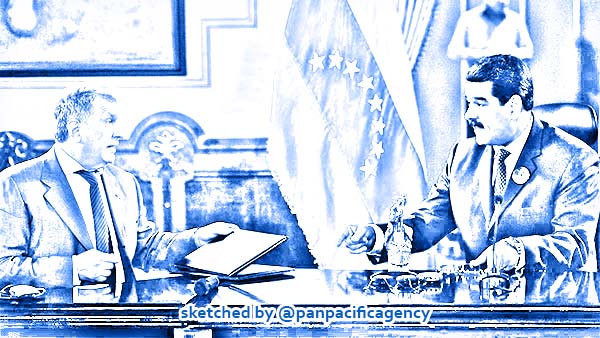Russia’s state oil company Rosneft pulls out of Venezuela over US sanctions

Rosneft chief executive officer Igor Sechin (left) and Venezuelan president Nicolas Maduro / FEDERICO PARRA / AFP. Sketched by the Pan Pacific Agency.
MOSCOW, Mar 29, 2020, FT. Rosneft said on Saturday that the deal included its stakes in five joint ventures with PDVSA, Venezuela’s state oil company — Petromonagas, Petromiranda, Petroperija, Boquerón, and PetroVictoria — that hold more than 80m tonnes in oil reserves and produce about 66,500 barrels a day, Financial Times reported.
The Kremlin is also buying Rosneft’s oil services and trading operations in the country. Other assets will be “closed or liquidated,” the company added.
A Rosneft subsidiary will receive 9.6 per cent of the company’s stock from the Kremlin in exchange for the assets.
“There are two reasons why Russia would want to hold on to Rosneft’s position in Venezuela,” said Francisco Monaldi, a fellow at Rice University’s Baker Institute and a Venezuelan energy expert. “First, to continue helping Maduro and second, most of Rosneft’s assets there were undeveloped and would be very valuable one day, so it makes sense not to lose them.”
The US Treasury sanctioned Rosneft’s trading arm last month for transporting Venezuelan crude in violation of Washington’s pressure campaign to oust Mr Maduro.
The sale transfers risk from the US sanctions from Rosneft — which is majority-owned by the Kremlin but listed in London, and counts BP and the Qatari sovereign wealth fund as large minority shareholders — to an unnamed subsidiary wholly owned by the Russian government.
“As a public international company, we have made a decision in the interests of our shareholders in the context of the situation that has objectively developed,” a Rosneft spokesman said. “Now we have the right to expect from American regulators to fulfil their publicly given promises,” they added, referring to statements from the US that sanctions against its trading arm would be removed if Rosneft wound down its Venezuelan business.
Russ Dallen, head of boutique investment bank Caracas Capital Markets, described the announcement as “amazing” and pointed out that “previous sanctions on a joint-Russian/Venezuelan bank also led to a similar outcome, with [Russian state lenders] VTB and Gazprombank giving their shares to the Russian government to avoid further US sanctions”.
The decision is an abrupt climbdown for Rosneft and its powerful chief executive Igor Sechin, a longtime associate of president Vladimir Putin and key figure driving Moscow’s close relationship with Caracas.
Russia’s financial and military support has helped Mr Maduro defy the US sanctions regime and a campaign, led mostly by western countries, to force him to step down and hold new elections.
Mr Sechin’s regular visits to Caracas over the years brought him so close to the former Venezuelan president Hugo Chávez that he headed Russia’s delegation to his funeral in 2013, then inaugurated a street in Chavez’ honour in Moscow.
As US sanctions cut Venezuela off from global markets, Rosneft gave Mr Maduro a lifeline through $6.5bn in loans between 2014 and 2018 that Caracas paid back in oil deliveries.
The Russian company was still owed $800m at the end of September 2019 and was being repaid around $400m each quarter, but has not provided an updated figure of the debt still owed at the start of 2020.
Rosneft Trading SA, the Geneva-based trading subsidiary, became Venezuela’s sole supplier of gasoline before the US sanctions hit last month.
The US also sanctioned Didier Casimiro, Rosneft Trading’s board chairman and president, but refrained from sanctioning Rosneft, the parent company, for fear of disrupting energy markets where it accounts for about 6 per cent of global oil production.
“This will benefit Rosneft’s minority shareholders, BP and Qatar, because they get rid of the cloud that was hanging over a good asset for both of them,” Mr Monaldi said. “Rosneft couldn’t have sold that asset to anyone else.”
Rosneft was marketing between half and two-thirds of Venezuela’s oil, he said, but exports were about to collapse in April due to the sanctions and the drop in demand. “For now, this won’t affect Venezuela,” said Mr Monaldi, “because there are much bigger problems. Most of Venezuela’s oil can’t be sold for more than $10 a barrel at the moment, which is beneath the cost of production.”
Max Seddon in New York and Derek Brower in London. Additional reporting by Henry Foy in Moscow and Gideon Long in Bogotá